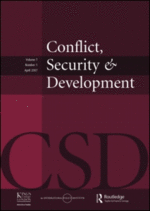Most conflict studies focus on the causes of war and violence. In contrast, this article on Ecuador explores the causes of peace in a country with strong conflict fault lines, a political army and several deep political crises during the last two decades. The article suggests that focusing on domestic capabilities for peaceful conflict management provides a new entry point to explaining why peace is sustained. An important aspect lies in the role of the armed forces and of civil society. Theories on civil-military relations provide an understanding of why armed forces intervene. However, there is less analysis of factors that influence political armies’ behaviour in terms of the use or non-use of violence. This is the focus of this article. Furthermore, the article asks why actors in civil society opt for non-violent strategies. In summary, the article analyses the capabilities for peaceful conflict management of national actors—particularly of the armed forces and of civil society—through a focus on their behaviour in three recent political crises, and by tracking the influence of historical experiences, cultural context and the structural and institutional framework on their behaviour.
Thoresen, Beate (2009) Rebellion Without a Shot—Peaceful Conflict Management in Ecuador, Conflict, Security & Development 9 (3): 361–385.







